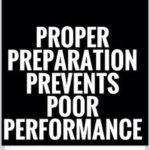
The following is a list of things that I have found to be extremely valuable in maintaining a music career of any type that provides a supporting income. This does not mean that other people do these things – but it does make doing these things all the more valuable in giving you an edge because OTHERS DON’T FOLLOW THEM. They are in no particular order:
1. Return all work related communication – including email, text, phone calls, social media messages – as soon as possible. Return all other communication within 24 hours unless out of the country. ASAP is defined as “as close to NOW regardless of how you feel, with the exception of other work in progressâ€. The people who are reaching out to you may well have asked multiple people about the date, and besides showing them that you value their time as well as your own, mostly the first person responding back will get the gig. Never look at any gig as “just one gigâ€, virtually any gig can lead to anything down the road that you never anticipated, so how you “perform†both on stage, the studio and in communication and general “ease of doing business with†will go a long way into your musical and financial future.
2 Plan your travel time to any gig so you will be at the very least early. What this means is that you leave at a time when even if there are multiple car accidents, freeway closures, etc., you will arrive in time. If you are early, you can use the time to return communications, etc. Any bandleader will love you for being there in plenty of time, and what people who show up at the last second for gigs are non-verbally telling all the other players on the gig “my time is more valuable than your time.†Many people who are habitually late do so knowingly or not because they are passive aggressively trying to show superiority and control over others. If you don’t think so, ask a mental health professional what THEY think on the subject.
3 Load all gigs as well as practice into a calendar. It doesn’t matter if you use an on-line or a paper calendar or both, do this as both a time management tool and a memory aid. The people with the best memories tend to be the people that will do this naturally, the people with the worst memories tend to be those that insist that they don’t need this – don’t be that person. This is also a fantastic way to learn how long things really take to do, because it you put everything you want to do into a day and find that you worked the whole time consistently, it is a good indicator that you don’t have a realistic understanding how long it takes to accomplish tasks and get to locations, and this can be actually CORRECTED by using a calendar and adjusting your time exceptions in the future – meaning, that phone call that you took in the middle of your day that “just took a second†actually was 30 minutes long, etc.
4 Have emergency gear items with you in your car at all times. I recommend things that they lack of would end any gig resulting in non-payment for your services, as well as reputation damage. I also recommend that you have things that other musicians will need that will again end the gig for you just as certainly as if you didn’t have them. This includes things like removable AC cables, power strips, long extension AC cords, extra 1/4 audio cables, guitar strings, picks and straps, fuses, extra microphones and cables, any special proprietary cables not easily found anywhere (“speakon†connector cables, USB, mini plug stereo to RCA/1/4 mono adapters, etc.) Put all of this stuff in some kind of emergency bag that is always in your car – and speaking of that, get a paper map book – don’t depend on a WIFI connection to get you to a gig.
5 Lastly, be a positive person to be around at all times. What that looks like is to compliment others on their performances – even if it’s on just some small thing that you honestly thought was good. But even mores, here’s a list of things to NOT do: don’t talk badly about other musicians behind their backs, don’t complain about the leader or the club owner or anyone else (you never really know who is listening or who you are talking to knows), AND don’t brag about other gigs and who you know. People who brag on gigs are always seen by the seasoned confident pros as insecure, and if someone is insecure, there is probably a reason that people will want to not have around them. One huge and interesting thing about other musician’s insecurities that you can use to your own advantage is to just say a little about yourself and leave it at that. Most people will actually assume that you have done way more impressive things just in mentally filling in the blanks of what you didn’t say.
The present and future “music business†is a constantly shifting and re-inventing place in terms of what it is and will be, and where income and employment can be found. But all of the topics listed here are universal truths that can be applied to any endeavor in life, and consequently are pretty much timeless and cross industry.
Doug Perkins
www.jazzguitarsociety.com
Nov. 19, 2019